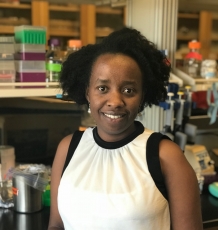
Dr Liliane Mukaremera
Lecturer
L.Mukaremera@exeter.ac.uk
2844
01392 722844
Geoffrey Pope 325
Geoffrey Pope Building, University of Exeter , Stocker Road, Exeter, EX4 4QD, UK
Overview
I am a lecturer in Biosciences at the University of Exeter and a member of the MRC Centre for Medical Mycology at Exeter. I obtained a BSc in biotechnology from the National University of Rwanda (East Africa) before completing a MSc and PhD in medical sciences at the University of Aberdeen in Scotland. I then moved to the University of Minnesota for my postdoctoral research studying the role of titan cells in the pathogenesis of the human fungal pathogen Cryptococcus. My current research focuses on understanding morphological factors, specifically cell wall modifications, which influence Cryptococcus pathogenesis and disease outcome.
Qualifications
2013 PhD Medical Sciences (Microbiology), University of Aberdeen
2009 MSc Medical Molecular Microbiology, University of Aberdeen
2008 Bachelor in Biology (Biotechnology), National University of Rwanda
Career
2019-Present Lecturer University of Exeter
2014-2018 Postdoctoral Associate, University of Minnesota, Minnesota- USA
2016-2017 Adjunct Professor, St Catherine University, Minnesota- USA
2015-2016 NIH Global Health Fogarty fellow, Kampala-Uganda
2007-2008 Teaching Assistant, National University of Rwanda, Rwanda
Research group links
Research
Research interests
Fungal pathogens cause a wide range of infection from superficial to systemic infections, and are associated with a high rate of mortality generally exceeding 50% of infected people. Most common human fungal pathogens include Aspergillus, Candida and Cryptococcus species. Despite being one of the top human killers, the study of fungal pathogens has been neglected and these pathogens continue to cause death in humans, especially in immunocompromised people. Research on fungal pathogens is therefore desperately needed to understand fungal pathogenesis and create new therapeutics to address the growing burden of fungal infections.
My work focuses on understanding morphological factors, specifically cell wall modifications, which influence C. neoformans pathogenesis and disease outcome. The cell wall is a unique structure to fungi (absent in mammals), and therefore is a great target choice for the development of new antifungal drugs. At present, there are no drug treatments for cryptococcal infection that target the cell wall. We are currently working on characterising C. neoformans cell wall as a potential antifungal drug target.
Research projects
Current projects:
1. Roles of Cryptococcus cell wall dynamics during infection and antifungal drug
resistance (AMS Springboard award)
2. Cryptococcus-Mycobacterium interactions: Framework for a co-infection model. (Co-investigator with Dr Ivy Dambuza from MRC CMM)
Past project:
1. A characterisation of the neuroinflammatory effects of cell wall and capsular fractions of Cryptococcus neoformans in a mouse organotypic brain slice culture system (Co-investigator with Dr Rachael Danarembizi from the Unievrsity of Cape Town)
Research grants
- 2021 Academy of Medical Sciences
Title: Roles of Cryptococcus cell wall dynamics during infection and antifungal drug resistance Meningitis caused by the fungal pathogen Cryptococcus neoformans kills many people with weakened immunity, such as those with cancer, organ transplant recipients and HIV/AIDS. In HIV/AIDS patients alone, this meningitis kills over 181,000 people each year even with antifungal treatment. Therefore, better drugs are urgently needed to treat Cryptococcus infection. To develop new drugs, we need a better understanding of the fungal pathogen causing the disease. Cryptococcus has a shield made of two layers; the capsule and the cell wall. This shield protects Cryptococcus from harsh environmental conditions and the immune system. Many studies have focused on the role of the capsule in Cryptococcus infections while the knowledge about the cell wall has lagged behind, despite it being a major target for the treatment of other fungal infections. The aim of this project is to determine how the cell wall changes in the presence of drugs used to treat patients suffering from Cryptococcus Meningitis. We will compare the cell wall composition of Cryptococcus cells grown in the laboratory with and without antifungal drugs, and Cryptococcus cells isolated directly from patients before treatment and 7 days into treatment. We will also identify how genes responsible for cell wall components are controlled in the presence of these antifungal drugs. The cell wall is absent in human cells, and hence is a great target for antifungal drug development. Thus, this project will provide crucial new information about the Cryptococcus cell wall that will be required for future drug development.
Publications
No publications found
Supervision / Group
Postgraduate researchers
- Alison Gifford
Research Technicians
- Eduardo Galue Mozo
Alumni
- Sophie Hodson 2021-2022
- Daniel Jones



